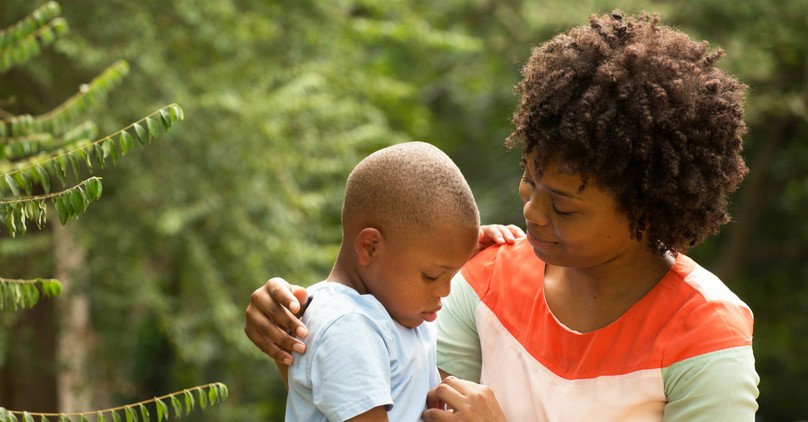
He doesn’t want us to raise our children in fear. He wants us to trust him with the future of our children, and part of that involves allowing them to navigate life’s challenges.
Holding a snuggly newborn for the first time evokes a cocktail of emotions in parents. Many people admit that becoming parents flipped their lives upside down. For some, priorities were shuffled, careers realigned, and some life habits tossed out the window. Faith Hill couldn’t have been more accurate in her song, “A Baby Changes Everything.” However, in maneuvering the newfound forceful love for their tots, some parents end up overparenting their children.
Overparenting entails being overinvolved in a child’s life in a bid to cushion them from life’s harsh realities. An overinvolved parent may be overprotective, micromanage their child’s schedule, shield them from any form of failure, discourage them from taking risks, allow them to gloss over chores, and ensure they don’t wallow in boredom.
Overinvolved parents will also move heaven and earth to ensure they solve their kids’ problems. They are often at their children’s beck and call, attending to all their whims. Although we live in a world fraught with danger, hovering over our kids and mollycoddling them does more harm than good.
Consequences of Overparenting
Overparenting is counterproductive, even harmful, as it stifles a child’s social development. It hampers their self-esteem, punctures their confidence, robs them of resilience, and results in poor coping skills. It also causes children to develop anxiety and depression. Overparented kids may also be overly dependent on others. They may also wind up entitled, expecting special treatment.
Overparenting, therefore, achieves the complete opposite of what the loving parents intended. Nobody starts out intending to raise poorly adjusted kids, but that often becomes the case.
Here are some suggestions on how overinvolved parents can change direction:
Ditch the Fear
Fear is often the overarching factor among overinvolved parents. To start, perhaps you fear that your children may face the same struggles you did in your childhood. You counter this by ensuring they get everything they ask for. You may also fear that they are susceptible to accidents, injuries, bullying, and kidnapping, among other dangers. Parents also worry that their kids will keep bad company and wind up making poor life choices. All these fears become the engine for overparenting.
And while it is the responsibility of parents to protect and guide their children, this should not translate into micromanaging their lives. We can keep them safe but still give them room to tackle challenges and evolve into their unique personalities. Furthermore, we need to remember that in the grand scheme of things, our children do not belong to us but to God. Parents and guardians are stewards. We discover who our children are as we raise them, but their real owner knew them before they were even conceived (Jeremiah 1:5). He predetermined their purpose before the foundations of the world.
King David brought this into perspective when he remarked that though his father and mother forsook him, the Lord would receive him (Psalm 27:10). Even well-meaning parents have the potential to fail their children. Only God is infallible in His fatherhood.
As stewards, God expects parents to nurture their children spiritually, physically, and emotionally. He asks us to raise them up in the way they should go, and when they are old, they will not depart from the right way (Proverbs 22:6). He doesn’t want us to raise our children in fear. He wants us to trust him with the future of our children, and part of that involves allowing them to navigate life’s challenges.
Learn from Your Heavenly Father
Undoubtedly, God is the best father there ever was. Does He mollycoddle us? Far from it. In fact, don’t we feel like he occasionally forsakes us? Like David, we sometimes find ourselves rummaging around for him when knee-deep in trouble. Look, our loving Father even allows us to trudge through the valley of the shadow of death (Psalm 23:4). No believer is exempt from tests. Before His ascension, Jesus gave us a rain check on escaping trials. He promised that we will have trouble in this world, but we are to be of good cheer since He has overcome the world (John 16:33).
Our Heavenly Father allows us to experience tough times because He knows it’s for our good. He asks us to receive trials joyously because the testing of our faith produces patience. His end goal is that we will be perfect and complete, lacking nothing (James 1:2-4). Job went through it all, losing everything he owned, including his children, besides being plagued by a ravaging disease. But deep down, he knew his Father was still up to something good. Even when writhing in great pain and despair, he was confident that after being tested, he would shine as gold (Job 23:10).
God knows that when the trials are long gone, we will be more Christlike. My best friend on campus loves to remind me of a heartbreak I nursed years ago after a guy I was dating ended our relationship abruptly. I was inconsolable then. But now, when I look back, my heart overflows with gratitude to God for that broken relationship. Our trials always achieve for us an eternal glory (2 Corinthians 4:17).
It would be wise of us to imitate this parenting gem from our Heavenly Father. Let’s avoid overparenting our children, snowploughing their path, and obliterating all the hurdles. Let’s allow them to speak up for themselves, solve problems, face the consequences of their actions, make choices, and do house chores. It’s okay for them to be bored, forge their own friendships, and have us decline some of their requests. It helps them develop much-needed fortitude and tenacity to muddle through life. They wind up mature and complete, lacking nothing.
Ditch Perfection
There’s a famous quote that says, “Parent the child you have, not the one you wish you had.” Sometimes we over-parent in a quest to modify our kids so that they fit the mold of what we deem as perfect children. Perhaps you envisioned that your child would be an excellent communicator and public speaker. On the contrary, they loathe the limelight and cringe at public speaking opportunities. Determined to have them fulfil your dream, you perpetually persuade their teachers to assign them speaking roles in school, much to your child’s displeasure. This only serves to aggravate them and heighten their anxiety.
Scripture describes children as gifts from God, and you can be sure that God only gives good gifts. Every good and perfect gift comes from the Father of Lights (James 1:17). When He gives us children, He expects us to nurture them and not tinker with their identity and personality. Their talents, gifts, strengths, and weaknesses are what make them unique. Our children have the imprint of God, and when we welcome them as they are, we welcome both Jesus and His Father (Mark 9:37).
Loosen Your Grip
Give your child back their independence by loosening your grip on them. When they come to you with a problem, encourage them to forage around for solutions. When they fail to finish their school project on time, don’t cover for them. Allow them to grapple with the consequences of their choices. Assign them their age-appropriate chores and ensure they do them well. When they complain of boredom, stay put. Let them wiggle out of it by themselves. When they get embroiled in conflict with their siblings or peers, don’t rush to rescue them. Give them a chance to flex their conflict-resolution skills. Above all, allow them to thrive in their God-designed individuality without coercing them to fit into your desired personality.
Photo Credit: ©GettyImages/digitalskillet








